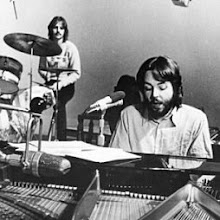Today, July 3rd, marks 38 years Jim Morrison died (or is he still living in Paris?), and 40 years that founding member of The Rolling Stones Brian Jones passed on. His death, found in a swimming pool, and unable to be revived, plus some conspiracy, is actually kind of boring. More interesting is his life.
With the Stones gruff image, automatically, one thinks of Jagger strutting around, or Richards doing obscene amounts of illegal substances, but Brian Jones had perhaps the roughest, most unglamorous appeal of them all. He had fathered 2 illegitimate children by his sixteenth birthday. His drug use was so crippling, that before his eventual overdose in aforementioned pool, his usage reduced his input in the band, got him fired, and inspired Jagger to pen a song called "Get A Line On You," a demo from 1969 later worked out as "Shine A Light" from "Exile On Main Street" (more of a tribute in its' final form).
Jones was heavily into the blues. He tried to write blues songs, but would never share them with the rest of the band, leading band members to speculate he either did not have any material, or if he did, it was not anything worthwhile.
Jones composing therefore is near non-existent. He is given credit on 14 songs along with the rest of the band, and also composed a soundtrack for the film "A Degree Of Murder." The soundtrack marked the first time a rock figure would score a film. That later took off, with George Harrison's "Wonderwall Music," numerous Pink Floyd scores, and countless other examples. The masters to the soundtrack are no longer in existence, nor was the soundtrack released, save for usage in the film.
Instead of composing, Jones played a huge role as a musician. His guitar was always of note on early Stones records, especially "weaving" with Keith Richards, but his talent became most obvious as the Stones (as the Beatles were doing) became more and more a "studio band." Jones would play slide guitar, mellotron, dulcimer, oboe, saxophone, and other instruments that would give songs unique sounds. However, his contributions began to dwindle by 1968.
Of course, he had been growing away from the band since fame first struck. The Stones were advised to shy away from blues covers, instead doing pop music. Jones was not satisfied with this, but went along. Relations with Keith Richards became tense (the final straw being when Jones' girlfriend left him for Keith.) And his overall insecurity led him to not want to play guitar with the band, and led him to attend sessions infrequently.
He became a road block for the band as 1968 moved along. Where as his musicianship had been adding flavor (psychedelic, eastern, bluesy, etc) before, he was now barely able to even play, and when he tried, he would only louse up sessions, and leave Richards to do all the guitar work. His inabilities led him to almost completely abandon work on "Let It Bleed" in 1969. He only contributed to 2 songs, and on one track ("Midnight Rambler") his guitar is inaudible. The Stones could no longer keep him, on any level of participation, after deciding to tour the US. His record (2 drug busts) would prevent the Stones from getting to perform in America. He was asked to leave on June 8th, 1969.
As far as the public saw it, Jones had left the band, due to a public statement. He was allowed the chance to do so, rather than admit being kicked out, by the rest of the band, willing to sacrifice the facts in order to not further bruise Jones' ego.
Jones retreated to his home (once owned by A. A. Milne, who wrote Winne The Pooh), where he spend his last month. He was reported as being very unhealthy, yet at the same time, he was also excited about starting a new band. He tapped Alexis Korner, Ian Stewart, and others, but he never made it to actually form a new band. On July 3rd, he was found in his pool, barely alive, and doctors were unable to save him.
Perhaps in a new band, he would have flourished. Maybe he had a latent talent for music that would finally come alive. Maybe he had, privately, been a great composer, only to paranoid to prove it. Maybe he one day could have returned to the Stones. So many maybes, but alas, they do no good.
Aside from his work with the Stones, Jones appeared on the Beatles "You Know My Name (Look Up The Number)", and produced an album called "Brian Jones Presents the Pipes Of Pan At Joujouka." The instruments are all played by Morrocan musicians, and are from a week long festival. Jones attended and recorded the festival, and intially, the music was too much for him. It was only reviewing the reels that led him to appreciate the music. His master mix is basically his interpretation of the recordings, and features different recordings edited together, laid atop one another, and mixed with some psychelic effects. Mick Jagger unearthed the mix after Brian died, and released it in 1971.
Also, Jones had supposedly recorded the song "Sure I Do," with the Rolling Stones, in 1963, and took the role of lead vocalist. The recording has never been heard, and may not even exist any more.
What else is there to say about Brian Jones? He was at times very private, he was very inscure, and he ultimately is left more to legend than any concrete music, save for his defining contributions to the Stones (mainly on "Between The Buttons," "Their Satanic Majesties Request," and, to the degree that he played on it, "Beggar's Banquet.")
What he could have been was destroyed by an ego and a consuming drug addiction.
Subscribe to:
Post Comments (Atom)













No comments:
Post a Comment